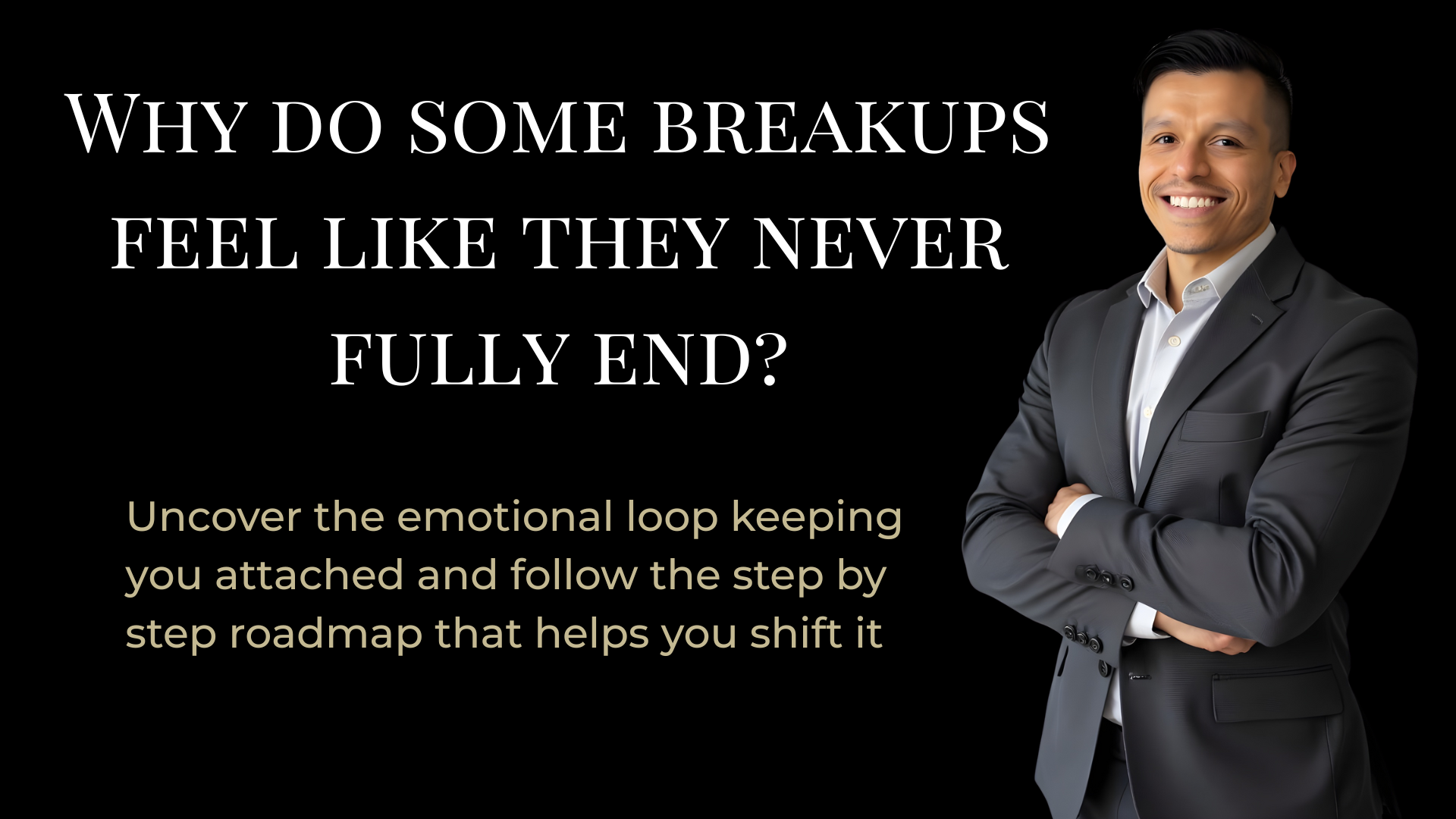
Why high-achieving gay men stay stuck on their ex longer than everyone else.
You built a career, a life, maybe even helped others... so why can't you get over him? This question haunts successful gay men at 2 AM when the world is quiet and their achievements feel meaningless against the weight of unresolved heartbreak. You're not broken, weak, or failing at life... you're experiencing something that exists at the intersection of high achievement and emotional vulnerability that few people understand.
The truth is, your success might actually be working against your recovery from this breakup. While everyone expects you to bounce back quickly because you "have your life together," the very traits that made you successful are now keeping you trapped in emotional quicksand. This isn't about lacking willpower or being dramatic... it's about understanding how your high-achieving mind processes loss differently than others.
The Success Trap: When Achievement Becomes Your Prison
Your professional success doesn't grant you immunity from emotional pain. Yet somewhere along the way, you internalized the belief that being accomplished should shield you from the messy, unpredictable world of feelings. When a relationship ends, you expect to handle it the same way you handle everything else... with strategy, logic, and swift execution.
High-achieving gay men often carry an additional burden of proving themselves worthy of love and acceptance. You've spent years building your career, your body, your social status... partly as armor against a world that didn't always welcome you. When that carefully constructed life fails to protect you from heartbreak, the cognitive dissonance is crushing.
The perfectionist mindset that drives your success becomes a liability in breakup recovery. You analyze every conversation, dissect each moment where things went wrong, and replay scenarios obsessively. Your brain, trained to solve problems and optimize outcomes, refuses to accept that some things simply cannot be fixed or improved through effort and intelligence.
The Control Paradox
Picture this scenario: You've always been the one who makes things happen. You set goals, create plans, and execute them flawlessly. But now you're facing a situation where control is an illusion, and your usual strategies feel useless. The harder you try to force yourself to "get over it," the more stuck you become.
This creates a feedback loop of frustration. You're not just grieving the loss of the relationship... you're grieving the loss of your sense of control and competence. Every day you don't feel better feels like another failure, another area where you're not measuring up to your own impossibly high standards.
The Analytical Mind's Double-Edged Sword
Your ability to think deeply and analyze complex situations serves you well in business, but it becomes a prison when applied to emotional recovery. While others might naturally move through grief by feeling their way forward, you get trapped in rumination loops that feel productive but actually keep you stuck.
Rumination masquerades as problem-solving. You tell yourself you're working through things when you're actually rehearsing pain. Your analytical mind searches for patterns, explanations, and solutions to a problem that doesn't have a logical fix. You can't think your way out of heartbreak the same way you think your way through a business challenge.
High-achieving gay men often intellectualize emotions as a coping mechanism. Growing up, you may have learned that emotional expression wasn't safe or welcome, so you developed sophisticated ways to process feelings through your mind rather than your heart. This served you well in creating success, but it leaves you ill-equipped to navigate the raw, illogical territory of loss.
When Intelligence Works Against You
Your intelligence allows you to see all sides of every situation, which means you can rationalize staying connected to your ex in ways that less analytical people cannot. You can construct elaborate justifications for why you should remain friends, why this breakup was actually beneficial, or why you need to understand every detail of what went wrong.
This intellectual flexibility, which serves you well in complex negotiations and strategic planning, becomes a liability when applied to recovery. You can talk yourself into and out of closure multiple times in a single day. Every rational argument for moving forward gets countered by an equally rational argument for holding on.
The Pressure to Have It All Figured Out
Society expects successful people to be emotionally bulletproof. Friends, family, and colleagues look to you as someone who has their act together, which creates enormous pressure to recover quickly and gracefully. You're not allowed to be messy, confused, or lost... after all, you have a reputation to maintain.
This external pressure becomes internalized shame. You judge yourself harshly for not bouncing back faster, for still caring about someone who's moved on, for letting emotions interfere with your productivity. You've built an identity around being capable and composed, and heartbreak feels like a public failure of that identity.
The gay community adds another layer of complexity to this dynamic. You've worked hard to establish yourself as a successful, desirable partner in a community where image and achievement often carry significant weight. Admitting that you're struggling with a breakup can feel like admitting weakness in a space where strength and success are currency.
The Performance of Recovery
You find yourself performing recovery rather than actually recovering. You go through the motions... dating apps, social events, focusing on work... while internally still being consumed by thoughts of your ex. This performance becomes exhausting, creating additional stress that actually prolongs the recovery process.
The pressure to appear unaffected leads to emotional suppression, which paradoxically keeps you more attached to your ex. When you don't allow yourself to fully feel the loss, your psyche keeps the emotional door open, hoping for resolution. The feelings you push down don't disappear... they go underground, influencing your behavior in ways you don't recognize.
Why Your Mind Won't Let Go
High-achieving individuals often develop what psychologists call "completionist" tendencies. You need closure, answers, and resolution. When a relationship ends without clear explanations or mutual understanding, your mind refuses to file it away as complete. It remains active in your mental processing system, demanding attention and analysis.
Your brain treats the unresolved relationship like an unsolved business problem. It keeps running background processes, searching for the missing piece of information that will make everything make sense. This constant mental activity prevents you from psychologically closing the door on the relationship.
The high-achieving gay man's mind also struggles with the concept of "wasted investment." You put significant emotional, temporal, and sometimes financial resources into the relationship. Your business-trained brain rebels against writing off that investment without extracting some value or lesson from it. This economic thinking keeps you psychologically connected long after the emotional benefits have disappeared.
The Narrative Need
Successful people are often skilled storytellers... you understand the power of narrative in business and life. When a relationship ends abruptly or without clear resolution, you're left with an incomplete story, and your mind desperately wants to write the ending. You stay attached because you haven't found a narrative that satisfactorily explains what happened and why.
This need for narrative completion can keep you engaged with your ex far longer than healthy. You interpret every interaction as potential story development, every social media post as a clue to the true ending. You're not just missing the person... you're missing the story's resolution.
The Path Forward: Reframing Your Relationship with Control
Recovery for high-achieving gay men requires a fundamental shift in how you approach emotional processes. Instead of trying to manage and control your way through heartbreak, you need to learn to navigate uncertainty with the same confidence you bring to business challenges.
Start by recognizing that emotional recovery operates on different principles than professional achievement. Success in business comes from analysis, planning, and execution. Emotional recovery comes from acceptance, patience, and allowing natural processes to unfold. These aren't contradictory skill sets... they're complementary approaches to different types of challenges.
Your analytical abilities can be redirected toward understanding patterns rather than solving problems. Instead of analyzing what went wrong in the relationship, analyze what you've learned about yourself. Instead of trying to fix the situation, focus on optimizing your response to it.
Redefining Success in Recovery
For high achievers, progress needs to be redefined. Instead of measuring success by how quickly you stop caring, measure it by how authentically you can engage with your emotions. Instead of judging yourself for still having feelings, acknowledge your capacity for deep connection as a strength, not a weakness.
Create new metrics for emotional progress that align with your achievement-oriented mindset while respecting the non-linear nature of recovery. Track your ability to engage with work, maintain friendships, and pursue interests rather than focusing solely on how often you think about your ex.
Transforming Your Greatest Liability Into Your Greatest Asset
The same traits that keep you stuck can become your greatest tools for recovery when properly directed. Your analytical mind, when focused on self-understanding rather than problem-solving, can provide unprecedented insight into your emotional patterns. Your high standards, when applied to self-care rather than self-criticism, can motivate exceptional personal growth.
Your natural leadership abilities can be channeled into taking charge of your recovery process... not by controlling outcomes, but by making conscious choices about how you engage with your emotions. Your capacity for deep focus can be redirected from ruminating about the past to creating an intentional future.
Most importantly, your ability to see the big picture can help you understand that this painful chapter is part of a larger story of growth and self-discovery. The same vision that helped you build your career can help you see beyond the immediate pain toward the person you're becoming through this experience.
Embracing Emotional Intelligence
High-achieving gay men often have highly developed intellectual intelligence but underdeveloped emotional intelligence. This isn't a character flaw... it's simply a result of focusing energy on areas that were rewarded and validated. Recovery becomes an opportunity to develop this underutilized capacity.
Emotional intelligence requires different skills than analytical intelligence... skills like tolerance for ambiguity, comfort with vulnerability, and ability to sit with discomfort without immediately trying to fix it. These skills can be learned and practiced just like any other professional competency.
Your Breakup Recovery Is Not a Reflection of Your Worth
The length of your recovery process says nothing about your value as a person, your capability as a professional, or your worthiness of love. High-achieving gay men often carry the burden of feeling like they should excel at everything, including bouncing back from heartbreak. This pressure is not only unrealistic... it's counterproductive.
Understanding why you stay stuck longer isn't about judgment... it's about compassion. Your analytical mind, your high standards, and your need for control aren't character flaws. They're the very traits that have created your success, and they deserve respect even when they complicate your recovery.
You're not failing at breakup recovery... you're experiencing it through the lens of a complex, accomplished individual who loves deeply and thinks thoroughly. These qualities make your experience more intense, not less valid.
The goal isn't to become someone who doesn't care deeply or think analytically. The goal is to understand how these traits affect your emotional processes and learn to work with them rather than against them. Your capacity for deep connection, even when it causes pain, is part of what makes you capable of extraordinary relationships when the right person comes along.
Moving forward doesn't require you to become less thoughtful, less successful, or less passionate. It requires you to extend the same patience and understanding to your emotional self that you would extend to any complex project requiring time, attention, and careful development. Your heart deserves the same quality of care you bring to everything else you value.
If you recognize yourself in these patterns, know that you're not alone in this experience. The intersection of high achievement and emotional vulnerability creates unique challenges, but also unique opportunities for growth and self-understanding. Your journey through this recovery will ultimately make you not just more emotionally resilient, but more authentically successful in all areas of your life.
Ready to Break Free from Heartbreak?
Discover the Proven Steps to Rebuild Confidence and Thrive in Life After Love.
Join a Community That Gets You and Helps You Thrive!
Join a community of high-achieving gay men receiving exclusive tools, tips, and support to overcome heartbreak and create a life they love.
We respect your privacy. Your information is 100% secure and will never be shared, sold, or used for spam. You can unsubscribe at any time.


